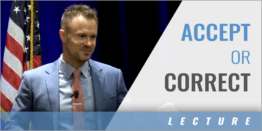|
Provided by: Raise Your Game The true test of a great leader is revealed not in what he does but what his people do without him. How does your team act when you're not there? How much slippage would there be if you took the week off? It takes tremendous security and confidence for a leader to hand off the reins. But it's vital. In his book Extreme Teams: Why Pixar, Netflix, Airbnb and Other Cutting-Edge Companies Succeed Where Most Fail, Robert Bruce Shaw examined companies that make a point of empowering employees. He pointed to a study of a manufacturing plant where the productivity increased 20 percent in two months, a colossal jump. The radical idea? The company let its employees have agency over seemingly minor things like shift schedules and uniforms. That dose of freedom led to a happier and more productive workforce. And the numbers proved it. Great companies, the visionary ones, have caught on to this idea. "Pick an area where your people are frustrated," wrote former Google VP Laszlo Bock, "and let them fix it. If there are constraints, limited time or money, tell them what they are. Be transparent with your people and give them a voice in shaping your team or company. You'll be stunned by what they accomplish."' Even in its early days, when Google was living in the gigantic shadow of Microsoft, the company practiced empowerment. Its founders were committed to "hiring the very best engineers we could and then getting out of the way." Micromanaging might give the boss a feeling of control, but it will suck away the employees' will to do their best. They will find somewhere else soon enough, a place that gives some autonomy with a boss who's comfortable giving it. If a coach truly wants the organization to thrive - and not just himself to thrive - then he should want free thinkers. He should seek out those who aren't afraid to challenge his point of view. As the saying goes: if everyone on your team is thinking alike, then someone isn't thinking. Allow for disagreements. Create an environment where subordinates are free to speak their minds. Netflix's CEO, Reed Hastings, along with his executives, has consistently encouraged openness and honesty, with little concern for where someone is in the hierarchy. It has served the company well; Netflix accounts for about a third of the Internet bandwidth in the United States! Former Netflix executive Patty McCord explained the company's mind-set in a Forbes interview: "All hiring should be based on starting with a problem you have to solve, and what it's going to take somebody to be great at solving it." Once the right people are on board, don't meddle and don't saddle them with unnecessary rules that do little but hinder them from shining. Serve them by trusting them. Orchestra conductors don't lead by playing every instrument; they lead by trusting everyone will properly play theirs. You can't force your will on people. If you want them to act differently, you need to inspire them to change themselves. -Phil Jackson |






